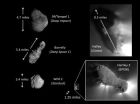(Press-News.org) An estimated 26 million people, 13% of the United States population, are living with Chronic Kidney Disease (CKD), and this number continues to grow. If current trends continue, there will not be enough doctors to serve this expanding patient population.
To help address this crisis, the American Society of Nephrology (ASN) is convening a Summit on the Nephrology Workforce during its upcoming ASN Renal Week 2010 in Denver, Colorado, on November 17. Participants will discuss this crisis, its implications, and strategies to increase the number of kidney disease doctors in the United States.
"The ASN leadership is deeply concerned whether there will be enough nephrologists in the future to meet the growing demand for kidney specialists," explains ASN Councilor Bruce A. Molitoris, MD, FASN, who chairs the ASN Task Force on Increasing Interest in Nephrology Careers.
The ASN Task Force is working to increase interest in kidney disease among medical students and internal medicine residents, particularly among underrepresented minorities and women. During the summit, Dr. Molitoris will present the task force's final recommendations, which include ways to improve faculty development, encourage mentorship, and increase grant support for students to learn more about how nephrologists conduct research and improve lives of patients.
Medical school deans, department chairs, division chiefs, and training program directors from across the country will participate in the summit to help ASN identify the best approaches to solving this future shortage of kidney professionals.
"We are distressed by the growing evidence of an upcoming crisis in the number of kidney doctors required to meet the needs of the millions of patients with kidney disease," said ASN President Sharon Anderson, MD, FASN. "We believe this summit is an important first step to ensuring that the millions who suffer from kidney disease continue to receive timely, high-quality care and that kidney research continues to advance our ability to address this growing epidemic."
###
ASN Renal Week 2010, the largest nephrology meeting of its kind, will provide a forum for 13,000 professionals to discuss the latest findings in renal research and engage in educational sessions related to advances in the care of patients with kidney and related disorders. Renal Week 2010 will take place November 16 – November 21 at the Colorado Convention Center in Denver, CO.
The content of this article does not reflect the views or opinions of The American Society of Nephrology (ASN). Responsibility for the information and views expressed therein lies entirely with the author(s). ASN does not offer medical advice. All content in ASN publications is for informational purposes only, and is not intended to cover all possible uses, directions, precautions, drug interactions, or adverse effects. This content should not be used during a medical emergency or for the diagnosis or treatment of any medical condition. Please consult your doctor or other qualified health care provider if you have any questions about a medical condition, or before taking any drug, changing your diet or commencing or discontinuing any course of treatment. Do not ignore or delay obtaining professional medical advice because of information accessed through ASN. Call 911 or your doctor for all medical emergencies.
Founded in 1966, the American Society of Nephrology (ASN) is the world's largest professional society devoted to the study of kidney disease. Comprised of 11,000 physicians and scientists, ASN continues to promote expert patient care, to advance medical research, and to educate the renal community. ASN also informs policymakers about issues of importance to kidney doctors and their patients. ASN funds research, and through its world-renowned meetings and first-class publications, disseminates information and educational tools that empower physicians.
ASN leads efforts to address growing crisis in kidney care
2010-11-11
ELSE PRESS RELEASES FROM THIS DATE:
Putting the spotlight on membranous nephropathy
2010-11-11
The Halpin Foundation and the American Society of Nephrology (ASN) proudly highlight the research advances in membranous nephropathy made possible by The Halpin Foundation-ASN Research Grant, created to help young faculty develop independent research careers. This award provides recipients transition funding toward successful application for an NIH RO1 grant.
Elena Torban, PhD (McGill University Faculty of Medicine), the 2008 recipient of The Halpin Foundation-ASN Research Grant, recently explained, "The generous financial two-year support provided by The Halpin Foundation ...
Team colors on cans change perceptions of alcohol risks, MU study finds
2010-11-11
COLUMBIA, Mo. ¬— Underage and heavy drinking on college campuses continue to be issues for college administrators. While some campuses, such as the University of Missouri, have made strides in efforts to reduce heavy drinking on campus, administrators are continually trying to educate students about the risks of excessive drinking. Now, two MU psychologists have found that students who viewed images of beer cans packaged and displayed in university colors believed that drinking beer was less dangerous than those students who saw images of regular beer cans.
"In this research, ...
University of Minnesota leads team in discovery of novel type of magnetic wave
2010-11-11
A team of international researchers led by physicists in the University of Minnesota's College of Science and Engineering have made a significant breakthrough in an effort to understand the phenomenon of high-temperature superconductivity in complex copper-oxides—one of the most studied scientific topics in history.
The University of Minnesota researchers and their international colleagues from Germany, France and China report the discovery of a novel type of magnetic wave involving oxygen atoms. The new findings could have implications for improving superconducting ...
NIH scientists unveil mechanisms of immune reconstitution inflammatory syndrome
2010-11-11
WHAT:
Newly published research by scientists at the National Institute of Allergy and Infectious Diseases, part of the National Institutes of Health, sheds light on a poorly understood, acute illness called Immune Reconstitution Inflammatory Syndrome (IRIS) that develops in some HIV-infected individuals soon after they begin antiretroviral therapy.
IRIS affects certain HIV-infected individuals whose immune systems are heavily damaged by the virus and who have a treated or undiagnosed AIDS-associated infection. When these individuals start antiretroviral therapy and ...
Cassini's CIRS reveals Saturn is on a cosmic dimmer switch
2010-11-11
Like a cosmic light bulb on a dimmer switch, Saturn emitted gradually less energy each year from 2005 to 2009, according to observations by NASA's Cassini spacecraft.
But unlike an ordinary bulb, Saturn's southern hemisphere consistently emitted more energy than its northern one. On top of that, energy levels changed with the seasons and differed from the last time a spacecraft visited in the early 1980s. These never-before-seen trends came from an analysis of comprehensive data from the Composite Infrared Spectrometer (CIRS), an instrument built by NASA's Goddard Space ...
Primordial dry ice fuels comet jets
2010-11-11
COLLEGE PARK, Md. – One of the biggest comet findings coming out of the amazing images and data taken by the University of Maryland-led EPOXI mission as it zipped past comet Hartley 2 last week is that dry ice is the 'jet' fuel for this comet and perhaps many others.
Images from the flyby show spectacular jets of gas and particles bursting from many distinct spots on the surface of the comet. This is the first time images of a comet have been sharp enough to allow scientists to link jets of dust and gas with specific surface features. Analysis of the spectral signatures ...
Pleasurable behaviors reduce stress via brain pathways, research shows
2010-11-11
CINCINNATI—Whether it's food or sex, pleasurable activity provides more than just pleasure, University of Cincinnati (UC) researchers say. It actually reduces stress by inhibiting anxiety responses in the brain.
The findings were published online Nov. 8, 2010, ahead of print in PNAS, the official journal of the National Academy of Sciences.
Experiments designed by Yvonne Ulrich-Lai, PhD, research assistant professor, James Herman, PhD, director of the Laboratory of Stress Neurobiology and professor of psychiatry and behavioral neuroscience at UC, and colleagues also ...
Economists reveal factors that help poor people lift themselves out of poverty
2010-11-11
What factors contribute to poor people in developing countries lifting themselves out of poverty?
A paper by economists Anan Pawasutipaisit of Thammasat University and Robert M. Townsend of MIT provides important insights into what kinds of households might be most effective at moving themselves out of poverty and how they are able do it.
The paper, "Wealth Accumulation and Factors Accounting for Success" appears in the current issue of the Journal of Econometrics. It suggests that poor people who skillfully manage their assets are especially successful in improving ...
Noninvasive brain stimulation helps improve motor function in stroke patients
2010-11-11
BOSTON -- A noninvasive electric stimulation technique administered to both sides of the brain can help stroke patients who have lost motor skills in their hands and arms, according to a new study led by researchers at Beth Israel Deaconess Medical Center (BIDMC).
Described in today's Online Issue of the journal Neurology, the findings showed that stroke patients who received bihemispheric transcranial direct current stimulation (tDCS) coupled with a regimen of physical and occupational therapy had a three-fold greater improvement in motor function compared with patients ...
JDRF clinical panel recommends next steps for artificial pancreas clinical testing
2010-11-11
Diabetes experts at a meeting convened by the U.S. Food and Drug Administration (FDA) and the National Institutes of Health (NIH) took the next step in advancing efforts toward the development of an artificial pancreas: putting forth clinical recommendations to ensure the safe and effective testing of artificial pancreas technology in real-life situations. We are pleased at today's meeting there was a strong consensus among leading clinicians, researchers and industry leaders regarding the path toward outpatient studies for both low-glucose suspend and artificial pancreas ...

